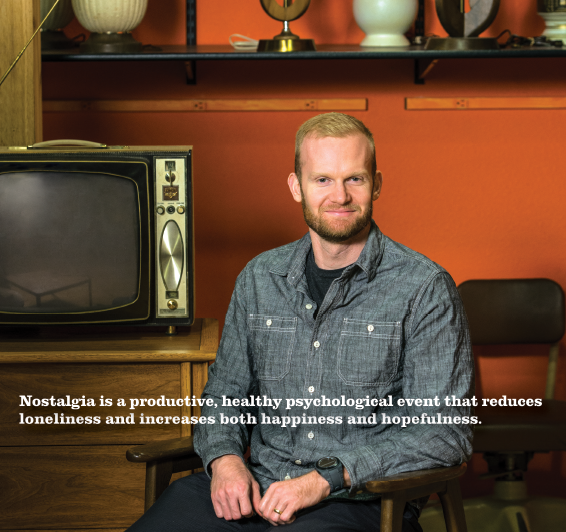
WHY THE GOOD OLD
DAYS ARE GOOD FOR US:
A CONVERSATION WITH CLAY ROUTLEDGE
BY CAROL KAPPAUN RACTCHENSKI
When I met Clay Routledge of the psychology department at North Dakota State University at a downtown Fargo diner, we shook hands and before I could welcome him or ask an opening question, he said, “Carol, are you a nostalgic person?” I did not have a quick answer, not “of course” but also not “hell no.” Four generations’ photographs hang in my den, but I don’t believe in scrap booking or saving my personal journals. I listen to Johnny Cash and so did my father. I think of my mom whenever I’m shoe shopping. »
“I have always been nostalgic,” Routledge tells me, “even as a kid.” He spent his childhood in West Africa before moving to southwestern Missouri where he graduated high school and college, earning a doctorate in psychology at the University of Missouri. After moving to South Hampton, England, as an assistant professor, his nostalgia became more than a personality trait or pastime, it became the focus of his research as a social psychologist.
Nostalgia has historically been viewed as a mental disorder, often associated with rumination, depression and a pathological attachment to the past. In 1688 Swiss physician Johannes Hofer described nostalgia as a neurological disease likely of demonic origins. In the 19th and 20th centuries nostalgia was described as “an immigrant psychosis,” a melancholic disorder associated with acute homesickness.
Social psychologists, including Routledge, study the human being as part of a social world. “Humans,” Routledge says “are the only animal who we know to understand time. This uniquely human competency is the focus of much of my work.” His research explores questions like how do humans think about time, the future, and our own mortality. What are the social implications of living with a temporal self? How accessible is an understanding of death? How does nostalgia affect death related cognition and death anxiety?
Routledge defines nostalgia as “a sentimental and wistful longing for the past. At the same time an emotion and a cognitive activity, nostalgia is an activity that essentially takes a dead thing and brings it back to life and keeps it alive.” Nostalgia is a productive, healthy psychological event that reduces loneliness and increases both happiness and hopefulness, a sign of mental health and a very real resource in times of stress.

Mainstream media, The New York Times, Psychology Today, Scientific American and others as well as academic journals have taken an interest in Routledge’s nostalgia studies. “I suspect,” he says, “that because nostalgia is an activity that most people identify with, people are naturally curious about why they are so nostalgic and what it does for them.”
Savoring the past is not only fun and often funny, it’s good for us, good for our psychological well being and good for our families and communities. If we once saw nostalgia as rumination or getting stuck in the past, something that keeps us from being fully alive in the present moment, research is telling us something different, something positively optimistic about our love of oldies radio, old movies and high school reunions. Nostalgia, while tinged with bitterness has primarily sweet outcomes.
Nostalgia, the cognitive replaying of a past cherished memory, motivates us to create positive experiences in the future by infusing us with growth emotions, gratitude, optimism and joy along with a bit of loss and longing. Reflecting on important memories increases a sense of meaning and a feeling of belonging.
The content of these cherished memories is universal: we remember a scene from the past where we are surrounded by other people, feeling cared for and connected, often overcoming adversity, celebrating this achievement. In time we see our experiences with a wider lens. The more negative, disturbing elements fade, a phenomenon psychologists call “fading affect bias.” This particular memory construct results in optimism about future relationships and experiences, builds in us the belief that we will be loved and feel belonging again, even if right now we are experiencing loneliness and separation. I remember summers at my grandparents’ lake cabin and I miss my grandma’s easy love and homemade buns and I cherish this as one of the best times of my life and I feel grateful to have had those times with my family and to know that I have been part of something so beautiful and happy. I begin to feel hopeful that life will bring me more such happiness and connection. Constantine Sedikides, psychologist and nostalgia expert at the University of South Hampton, says, “When you become nostalgic, you don’t become past-orientated. You want to go out there and do things.”

Routledge’s research relies on a nostalgia scale developed by him and colleagues during his tenure at South Hampton University. Using this measurement researches have found nostalgia to be an organic human response to stress and low mood worldwide, including in children as young as seven years old. In addition to rise in mood and hopefulness, nostalgia warms us physically. Human beings it seems are more nostalgic on cold days and in cold rooms for a good reason. Bringing his passion for nostalgia to North Dakota may be a very good idea.
Related research reveals that nostalgia makes people more generous to strangers and more tolerant of outsiders, all the while counteracting loneliness, boredom and anxiety. It makes death less frightening and increases optimism toward the future, while motivating behavior that promotes social connection and personal meaning. Perhaps what the world needs, no matter the climate, is more people who practice nostalgia and in doing so live with more tolerance and optimism and generosity.
Contrary to clichés that may dismiss nostalgia as a waste of time, one that even contributes to low mood, Routledge says, “nostalgia is an instinctual compensatory response to the negative emotions that accompany perceived low social support.” Feelings of loneliness organically trigger nostalgia and nostalgia then creates positive feeling states. According to Routledge and his colleagues, “we can use the treasured times of the past to feel better today and to create a happier more connected future. It can get people pumped up about today and tomorrow’s possibilities. It can mobilize you to take on future challenges.”
Routledge’s research consists of studies with English, Dutch and American adults, most recently college students at NDSU. Experimenters induce nostalgia by playing hit songs from the past for some people and letting them read lyrics to their favorite songs. Afterwards, these people were more likely than a control group to say that they felt “loved” and that “life is worth living.” Subjects were also less likely to be convinced by a bleak essay when they were first induced to nostalgize. “Nostalgia serves a crucial existential function,” Routledge says. “It brings to mind cherished experiences that assure us, even in the face of bad news and difficult feelings, that we are valued people who have meaningful lives, that we will again know love and belonging even if presently we’re experiencing loneliness and separation.”
Research also shows that people who reported worrying that their lives lack meaning who spend just five minutes writing about an experience that makes them feel nostalgic see a significant increase in psychological well being, feelings of increased aliveness, energy and personal worth.

We can all use nostalgia as a tool, be mindful of incorporating it into our daily lives. Look at those family movies, reminisce with old friends, remember your first kiss, first time playing quarterback, first sorority dance. Feel those moments that remind you of life’s meaning and your circles of connections. We can even maintain a nostalgia repository, memories we call to mind when we need a psychological lift. “Don’t look back at the past with a those-were-the-days stance,” warns Routledge. “Don’t compare the past to the present and find the past sweeter and better. Rather use those important memories to generate hope and joy, and optimism for the future.”
Nostalgia is not simply an American or European obsession. In her May 20, 2013, article in The New Yorker, “Why a Great Wave of Nostalgia is Sweeping Through China,” Amanda R. Martinez writes that in China too nostalgia has a growing place in popular culture. Chinese adults seem to be seeking more and more nostalgic experiences to cope with the current social world, a world that is ever more lonely and isolating in part because China is now a generation into its one child per family culture. A popular restaurant chain in China precisely replicates the Chinese public elementary school cafeterias of the 1980s.
Everywhere cultural critics and marketing execs know that nostalgia sells and feels good. Grateful Dead cover bands thrive, fashion recycles itself, images of childhood movies, comic books and literature make comeback after comeback. In 2013 the top grossing movies included two devoted to comic book heroes of the past, a reimagined visit to the Land of Oz, a Star Trek reboot, and Monster’s University, which offered parents a side-trip down college’s memory lane while entertaining their children as well. Routledge collects the stand up arcade games of his youth and admires his good friend’s Star Wars toys and Lego collection.
While human beings turn to nostalgia naturally, perhaps we could learn to do it more intentionally, put this organic tool to better psychological use by choosing nostalgia in response to painful feelings including loneliness and hopelessness. No side effects, no cost, no reason not to dust off that old Donnie Osmond album or the Ramones or Frank Sinatra. Sway, sing along, we’ll all feel better.
Routledge’s research continues into deeper questions: Is there benefit to nostalgia in subclinical dysphorics, people experiencing clinical depression or other mental illnesses? Could there be such a thing as too much of a good thing? Routledge writes a “nostalgia blog” at www.psychologytoday.com/blog/more-mortal and continues to recall and enjoy his favorite things about childhood in Africa and Southwestern Missouri and his days as a new professor in England, his children’s first steps and recitals, not just because it feels good, because it’s good for him. It also motivates him to create an interesting, meaningful life today and a storehouse of memories for later.



 Contents
|
Email us
|
PDF version (Requires Adobe Acrobat Reader)
Contents
|
Email us
|
PDF version (Requires Adobe Acrobat Reader)
































